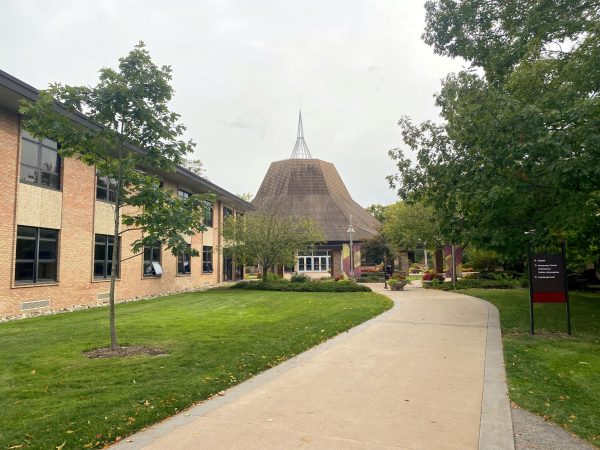As RCA churches talk about splitting, they do so with grace
Many expected this year’s General Synod of the Reformed Church in America to devolve into incendiary debate — as the most prominent point of contention was the issue of human sexuality — however, according to Rev. Ron Rienstra, Synod featured an “irenic spirit,” as discussion of highly controversial topics was surprisingly subdued. While the denomination fractures over the issue of human sexuality and splinter groups such as the Alliance of Reformed Churches continue to take shape, the RCA Synod boasted calm conversation between opposing perspectives.
Although the ARC has suggested that many churches will be leaving the RCA to join the new association, it is too soon to know just how many churches will leave. And as many point out, each church will need 75 percent of their consistory to vote in favor of leaving the denomination to start the process.
Rienstra, professor of preaching and worship arts at Western Theological Seminary, succinctly described the current landscape of the RCA: “The denomination is fracturing, and it’s fracturing along fault lines that were established decades if not centuries ago,” Rienstra said. “Although the presenting occasion is human sexuality, the underlying issue is, theologically speaking, biblical hermeneutics.”
My work has been so focused on unity that the divisions have been very profound for me theologically and personally. It’s very sad to see my denomination splitting.
General Synod took place from Oct. 15-18 and saw relatively peaceful discussion of three main proposals: one that allowed for a grace-filled departure for churches who no longer felt at home in the RCA, a second that would explore the creation of affinity-based classes as opposed to the standard geographically-based classes and a third that would make RCA missions into an independent entity apart from the denomination, the latter of which failed to pass. Although the meeting set forth a path for churches to leave the denomination, after two weeks few Grand Rapids churches have filed official requests to leave.
Religion professor Monica Pierce has been teaching part-time at Calvin for three years while working for the RCA as its ecumenical associate, facilitating relationships within the denomination. Now, apart from teaching at Calvin, Pierce is also the interim executive director of Christian Churches Together — a national ecumenical organization. Pierce grew up in the RCA, attended RCA universities and seminaries and worked for the RCA. She is deeply committed to the denomination and focuses on issues surrounding church unity.
“My work has been so focused on unity that the divisions have been very profound for me theologically and personally. It’s very sad to see my denomination splitting,” Pierce said.
For Pierce, the division of the church is a personal matter. “I think it grieves the heart of God that we already have over 40,000 denominations in the world and even more are forming out of this division in the RCA,” Pierce said.
Pierce’s husband, Rev. Steve Pierce, is senior minister at Central Reformed Church in Grand Rapids.
As the oldest RCA church in Grand Rapids, formed in 1918 when First and Second Reformed merged, Central is firmly dedicated to the RCA. First Reformed was founded in 1840, 10 years before Grand Rapids was incorporated as a city, and Second in 1854. Steve Pierce is in his fifth year at Central.
He noted that with divisive topics like human sexuality, the church’s long history encourages his congregation to hold firm and work through difficult conversations.
“We have been a church traditionally that has held the middle ground,” Steve Pierce said. “We have had people leave in the past because of not being liberal enough or being too conservative. If that’s the case then we’re probably doing something right.”
Their focus is ultimately not on themselves. “The center for us has always been Christ,” Steve Pierce said. “He has always been, will always be, enough to keep Central together.”
For Central Reformed, there’s no talk of leaving the RCA.
“We are 100 percent committed to the Reformed Church in America. There is no conversation happening in our church, in any of our circles, about leaving. There’s no one here that would leave,” said Steve Pierce.
Rev. Eric Barnes co-pastors Second Reformed Church alongside his wife, Miriam Barnes, in Zeeland. They came to the church as associate pastors seven years ago and have been serving as co-pastors for the last three years. Like Steve Pierce, Barnes affirmed that his church has no intentions of leaving the RCA.
“Our church is committed to the RCA. Without a doubt,” he said.
However, Second Reformed is a black sheep among the Zeeland classis, one of the most conservative in the area, according to Barnes.
“We had a classis meeting and two churches in our classis so far have filed petitions to leave,” Barnes said. “My sense is there’s potential that half of Zeeland classis leaves in the next year.”
This small number of current petitioners — and similar numbers he’s heard from churches in other classes — make him skeptical of the ARC’s claims.
“The ARC in particular has been touting that they’re bringing in all of these folks. As I heard at Synod from various people, they have been inflating their numbers,” Barnes said. “We don’t quite know how many are going to leave.”
Rev. Dave Zomer, minister of Bethany Reformed Church in Kalamazoo, falls in line with Steve Pierce and Barnes. Zomer doesn’t see his congregation petitioning to leave, either, and has not witnessed a groundswell of churches leaving his classis.
Bethany Reformed is a 105-year-old church deeply rooted in the RCA. The congregation, like Central Reformed and Second Reformed, is largely moderate and isn’t looking to leave the denomination.
While local RCA churches watch to see who will stay and who will go, local CRC churches are getting a sense of what their denomination may look like in a few years.
“We have a good 50-50 — 50 conservative, 50 liberal. I don’t think we could ever get 75 percent one direction or another,” Zomer said.
But Zomer isn’t worried about the other churches in the Southwest Michigan classis leaving the RCA, either.
“In our classis there are no official requests to leave at this point,” Zomer said. “There’s maybe a dozen churches that say they’re going to leave, but they’ve been saying that for three years.”
Zomer estimated that perhaps six to 10 of the 25 churches in his classis are considering leaving the RCA. However, Zomer is on the subcommittee that deals with the legal filing of requests to leave and not one official request has come through. He wouldn’t be too shaken if a few requests did appear, however.
“If you’re left with 15 churches, life goes on,” Zomer said.
While local RCA churches watch to see who will stay and who will go, local CRC churches are getting a sense of what their denomination may look like in a few years.
“The CRC will be looking at more permanent divisions in the future as well,” Monica Pierce told Chimes.
But her warning for the CRC is not without hope. Even though the RCA is splitting, they’re doing so amicably, something Barnes and Zomer, who both attended Synod, were pleased to see.
“Even in intense moments there was graciousness,” Barnes said. “In the current political and world and church climate, to have a meeting where people weren’t verbally assaulting those they disagreed with was pretty amazing.”
“People still had opinions but the sharpness had gone away,” Zomer said. “The vast majority of people were kind and considerate — that surprised me in a very pleasant way.”
For Monica Pierce, who grieves the fracture of the denomination, this peaceful end to the conflict has been a source of hope.
“It gets better. There’s hope after all of the disagreement and pain,” she said. “This general synod and the unexpected spirit of peace that we saw there is a foreshadowing of the brighter days ahead for the RCA.”








Kirk Vanhouten • Nov 3, 2021 at 2:55 pm
It would seem basic journalistic standards would require this story include comments from at least one RCA church leaving the denomination.
Jeremy Visser • Nov 3, 2021 at 2:48 pm
I’m thankful that Central and Second who have both supported the work of Room For All (LGBTQIA+) in various ways at various levels are being gracious when other churches in the RCA have chosen to no longer partner with the desired direction they have been seeking for years.
Question – as a journalist, how did you come to the conclusion that these church congregations mentioned are “moderate?” Second is the most progressive church in Zeeland Classis and it’s not even close. Second has been “progressive” by RCA national standards for 30 years. And that’s not an incendiary comment, it’s simply a statement of fact that Second itself would acknowledge. A Church that has pastoral support for RFA is not “moderate” by any credible standard.
Did you reach out to ARC for any comment? Did you seek out a true “moderate” church or professor for this article? The selections for the article are your prerogative, but a journalist should be clear to the audience which segment of the RCA is speaking – and that didn’t happen here.
Barbara Yandell • Nov 3, 2021 at 2:08 pm
I watched the whole procedure and was in constant contact with conservative RCA pastors.I remitted my voting delegate status because I am now a board member of ARC. The reason it was subdued is that decisions had already been made and there was rather a sadness and resignation to the fact. The issue of contention is not sexuality, it is rather orthodoxy and scripture itself. The sexuality problem is simply a manifestation of a vast difference in how we view the scriptures and the gospel ” Once and for all committed to the saints.”
John Hubers, PhD • Nov 3, 2021 at 10:30 am
Just note that the primary reason Synod didn’t devolve into devisive, incediary chaos is largely because the hard core conservatives had already made a decision to leave the denomination. They weren’t there. The irenic nature of the deliberations can be attributed to that.